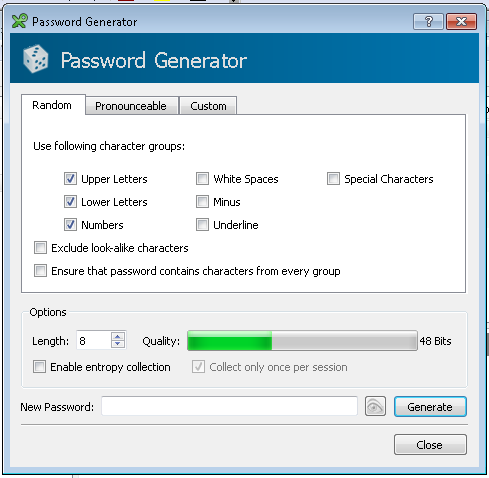
#KEEPASSX DEBIAN INSTALL#
It is available in the Debian official repositories, therefore can be installed using the apt-get command.Įxecute this command in Terminal to install Perl utility: $ sudo apt-get install perl
#KEEPASSX DEBIAN PASSWORD#
Perl is another command-line utility that can be used to generate a secure random password in Linux systems.
#KEEPASSX DEBIAN ANDROID#
GPG is an open-source command-line utility for generating secure passwords in your Linux, Microsoft Windows, and Android systems.įor instance, the following command will generate a secure random password of 16 characters in an ASCII armored format. If you compare the output of both commands, you can see the latter one is more complex and includes symbols. The command, in this case, would be: $ pwgen -ys 16 1

Now let’s try adding some options in the pwgen command to generate an entirely random password that contains symbols in it. To generate one 16 character password, the following command can be used: $ pwgen 16 1 B: Do not add vague characters in the password y: Add minimum one symbol in the password n: Add minimum one number in the password A: Do not add capital letters in the password c: Add minimum one capital letter in the password Here are some of the useful options that can be used with the pwgen command: The general syntax of Pwgen command is:` $ pwgen Use the following command to see the help: $ pwgen -help The pwgen “help” command includes a lot of options using which you can customize the password. It will take a while depending upon your internet speed after which it will be installed on your system. Execute this command in Terminal to do so: $ sudo apt-get install pwgen So in order to use Pwgen, you will have to manually install it. Pwgen is not already installed in the Linux distributions. It generates such passwords that users can easily memorize. Pwgen is another command-line utility that can be used to generate secure passwords. -base64: ensures that the password format is user-friendly.

Rand: OpenSSL function that generates a pseudo-random password.To generate secure passwords using OpenSSL rand function, execute this command in Terminal: $ openssl rand -base64 14 To install the rand function in OpenSSL, execute this command in Terminal: $ sudo apt install rand OpenSSL is pre-installed in most of the Linux distributions. Base 64 encoding uses “A–Z, a–z, 0–9, + and /” characters only. If the output of rand function is fed to the base64 encoding, password format can be made more user-friendly. Just specify the byte length of the password you want to generate and OpenSSL will perform all the computation and generate password.

Open SSL is a command-line utility whose rand function can be used for generating secure random passwords in a Linux system. When the search result appears, click on the Terminal icon to open it. Then in the search bar, type the keyword terminal. To open the command-line Terminal in Debian, go to the Activities tab in the top left corner of your desktop. Some of these tools are command-line based while some are based on GUI. We have run the commands and procedure discussed in this article on Debian 10 system. In this article, we will be discussing some tools in Linux through which you can generate such secure and strong passwords. Also, a password should not be based on common names and dictionary words. The common thinking is that a strong password must be of a minimum of 14 characters and contains lowercase letters, upper case letters, numbers, and symbols. The important point is to generate a password that is secure enough to rely on and that follows all the basic requirements of a strong password. We all know the importance of a secure password in our system, services, online account, and other critical applications.


 0 kommentar(er)
0 kommentar(er)
